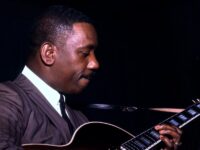 NICK DERISO: Recorded live at the club Memory Lane in Los Angeles over a two-night stand on May 25-26, 1967, trumpeter Dizzy Gillespie’s five-track “Swing Low, Sweet Cadillac” is sometimes criticized for its brevity.
NICK DERISO: Recorded live at the club Memory Lane in Los Angeles over a two-night stand on May 25-26, 1967, trumpeter Dizzy Gillespie’s five-track “Swing Low, Sweet Cadillac” is sometimes criticized for its brevity.
Sure. There have been boxed sets produced with slighter source material.
Still, Gillespie, in particular on tracks like the standout Brazilian-tinged “Mas Que Nada,” remained at the peak of his powers as an interpreter in the Latin style — playing both muted and open horn on the minor Sergio Mendes hit. Quintet member James Moody appears here, and throughout, on both sax and flute.
And I always find myself toe tapping through the goofy, groovy title cut “Swing Low, Sweet Cadillac,” then marvelling over a memorable 16-minute take on Gillespie’s “Kush” that closed out this Impulse Records release.
Gillespie’s “Bye” is an uptempo romp, while the perhaps blessedly brief “Something in Your Smile” (from the then-current motion picture “Doctor Doolittle”) is played as a straight-ahead ballad. Of course. The audience is waiting for the joke, so Gillespie — with, no doubt, another wink — makes sure it never comes.
The title track, an updated version of Gillespie’s takeoff on the familiar hymn “Swing Low, Sweet Chariot” from his days with Charlie Parker, begins with a frisky, wordless Gillespie chant and a building rhythm. Moody adds in his own humorous call-and-response, as drummer Otis “Candy” Finch and pianist Mike Longo quietly join the proceedings.
By the time the tune gets underway in earnest, three-and-a-half minutes later, the assembled crowd is edging off their seats in anticipation. All of the signifying characteristics from the Dizzy myth are there — the intricate, often spellbinding flights of improvisation and his memorably impish humor: Gillespie closes the tune by adding: “Old Cadillacs never die, the finance company just takes them away.” (He later recorded yet another version, embedded below, with the Muppets.)
 Meanwhile, the offbeat 6/4-timed “Kush” (named after a civilization from 2000-1500 BC centered in what today is Sudan) is inspired by and, Gillespie reminds, dedicated to Mother Africa. One of Gillespie’s best-known compositions, it only builds on the intensity of “Swing Low” — showcasing the showmanship and playfulness of Gillespie at his late-period best.
Meanwhile, the offbeat 6/4-timed “Kush” (named after a civilization from 2000-1500 BC centered in what today is Sudan) is inspired by and, Gillespie reminds, dedicated to Mother Africa. One of Gillespie’s best-known compositions, it only builds on the intensity of “Swing Low” — showcasing the showmanship and playfulness of Gillespie at his late-period best.
There are, in this rumbling ride across the North African landscape, trotting joys and dry, sharp winds. In the ongoing conversation with Gillespie and his quintet, we hear purring big cats, shivering reptilian asides, and jarring howls from creatures unseen — all over a never-ceasing rhythm.
At almost precisely the midpoint in the journey, they pause, and the audience erupts in applause. Moody, who opened on flute, then charges back in for an extended soloing interlude on alto.
I have much the same sense about “Swing Low, Sweet Cadillac.” I know, going in, that this is an incomplete document, and I keep waiting for it to disappoint. Instead, I’m always pleased when it provides another bright blast of delight.
No one could argue that it’s essential Dizzy, not for a musician who made so many lasting contributions as jazz moved from big bands to bop. Even so, I keep “Swing Low” handy, charmed as I remain by its merry, quickly passing vibe.
Dizzy still makes jazz fun.
- How Deep Cuts on ‘Music From Big Pink’ Underscore the Band’s Triumph - July 31, 2023
- How ‘Islands’ Signaled the Sad End of the Band’s Five-Man Edition - March 15, 2022
- The Band’s ‘Christmas Must Be Tonight’ Remains an Unjustly Overlooked Holiday Classic - December 25, 2016



